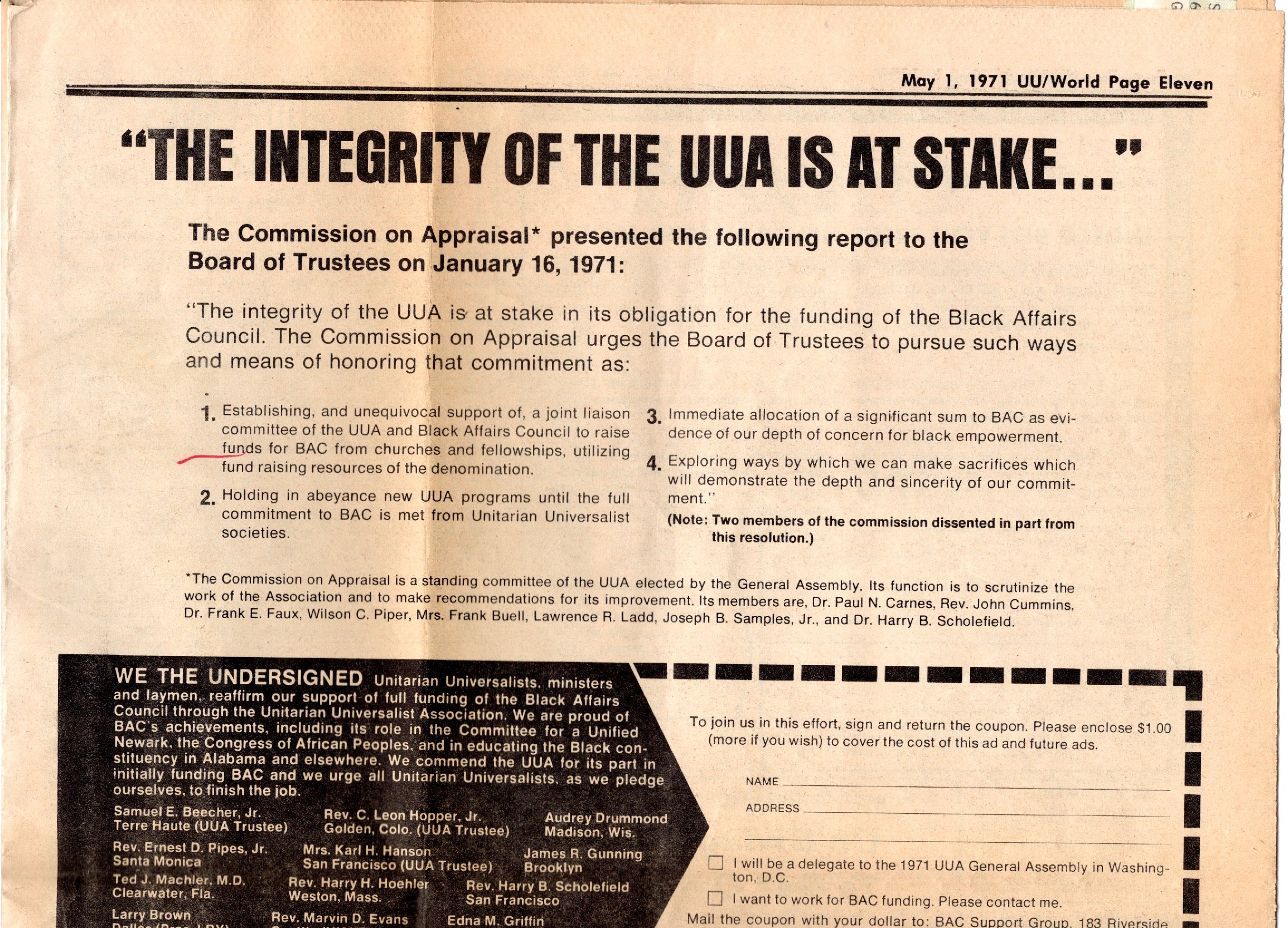1971
General Assembly in Washington, D.C.
On January 16, 1971, the UUA Commission on Appraisal, a committee that was tasked with recommending ways for the UUA to improve, presented a report in which they urged the Board to pursues ways to meet its commitment to BAC and hold new programs in abeyance until the UUA has met its commitment to BAC. That was a very positive sign for BAC and its supporters in advance of the 1971 General Assembly.
BAC Supporters took out an ad in the UU World highlighting the report by the Commission on Appraisal.
The 1971 General Assembly was held from June 7-12. BUUC also boycotted this Assembly but their interests were represented by African Americans who were delegates of their home congregations as well as white allies. The Pacific Southwest Division, including our church, organized delegates to vote in favor of the resolution to fund BAC.
UUA President West indicated that he regretted that the issue of funding for BAC would come down to an up-or-down vote and recognized that “Whether the measure passes or loses we all lose. There will be another splitting of the denomination.”
A resolution to fully fund BAC was made and a substitute resolution was offered by Warren Ross of New York (later called the “Ross Resolution”) to establish a Racial Justice Fund that would fund racial justice efforts broadly, including BAC and BAWA. Another amendment was offered to fund the BAC at an amount equal to 10% of the total UUA budget until the funding commitment was fulfilled. That amendment failed. Ultimately the Ross Resolution passed by a vote of 467-404.
Here was BAC’s response to the Ross Resolution, distributed on June 11, 1971, the second to last day of the Assembly:
Fritchman’s commitment to fundraise for BAC continued after the 1971 vote. In September of that year, he wrote to congregations and individuals saying that each had to decide whether “to support BAC and send less to the UUA … or to throw in the sponge and say we are indeed the white racist movement some have called us.” Fitchman had decided to fund BAC and encouraged others to do the same.
The BAC had fundraising success in 1971-1972 and was able to raise more than $800,000. Despite their success and fundraising, the BAC was burdened by differences in direction and strategy. In 1973, the BAC changed its name to the Black Humanist Fellowship, further separating itself from the UUA. Soon thereafter, the BAC became embroiled in a legal dispute with one of its members regarding money lost on bonds and eventually dissolved. The UUA did not formally explore what happened during this period until 1979.
- Final Thoughts -
There are many lessons to be drawn from the Black Empowerment Controversy within the UUA. Rev. Mark Morrison-Reed details many of them in his book, and there is no need to repeat all of them here.
There are some lessons specific to our church that deserve attention. Primarily, we should proud of our church’s efforts to push our fellow Unitarian Universalists on issues of race. We took a progressive and, at the time, radical position and persuaded many to join us in the cause. While some of the tactics used may not have led to the desired result, there is no questioning our church’s passion and energy for justice.
It’s inspiring to see that the spark of what happened arguably started in Los Angeles when a few of our members found the strength to gather together and engage in the process of self-determination and self-empowerment. While our head minister, Rev. Stephen Fritchman and Associate Minister Roy Ockert get much of the attention for their hard work and efforts to support Black empowerment, we must also not forget the lay leaders within our congregation like Jules Ramey and Althea Alexander who founded BURR and BAC. I hope that the story on this page will highlight their efforts and inspire the next Jules and Althea.
A list of additional resources on the Black Empowerment Controversy can be found here.


